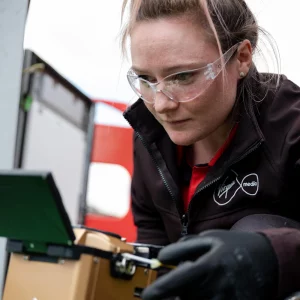Sponsored Links
ARIN Warns ISPs - IPv4 Internet Addresses to be Depleted by 2010
Posted: 29th Apr, 2009 By: MarkJ
The American Registry for Internet Numbers (ARIN) has become the latest major Internet organisation to warn that IPv4 addresses will run out by 2010. ARIN has now begun issuing letters to ISPs owning blocks of IPv4 addresses, which encourages them to adopt IPv6. The group will also begin making it more difficult to gain new IPv4 addresses via a tougher vetting process.
For those not in the know, an IPv4 address is assigned to your computer each time you go online (e.g. 123.23.56.98). It is a unique online identifier made up of four number groupings and allows you to communicate with other computers around the world; not unlike a phone number for voice calls.
Sadly you can only have so many IPv4 addresses and as a result IPv6 was designed, which is not only longer but also more secure by design. They are 128bits long, written in hexadecimal and separated by colons; for example:
Related News:
16 May, 2008 - OECD Warns of Internet Address (IPv4) Shortage
27 May, 2008 - EC Sets IPv6 Adoption Target of 25% by 2010
20 August, 2008 - ISPs will Fail to Meet IPv6 Adoption Targets
25 September, 2008 - Vint Cerf Warning - The Internet is Still Running out of IPs
04 December, 2008 - IPv6 Uptake Increases by 300 Percent
For those not in the know, an IPv4 address is assigned to your computer each time you go online (e.g. 123.23.56.98). It is a unique online identifier made up of four number groupings and allows you to communicate with other computers around the world; not unlike a phone number for voice calls.
Sample of ARIN's letter to ISPs
SUBJECT: Notice of Internet Protocol version 4 (IPv4) Address Depletion
Dear ****** *******,
This letter concerns the fact that Internet Protocol version 4(IPv4) addresses are running out and calls your attention to what we are doing about it. You are receiving this letter as your organization currently utilizes IPv4 number resources.
IP addresses are the numbers behind domain names and are essential to the Internet. In May 2007, the American Registry for Internet Numbers (ARIN) advised the Internet community on IP address depletion in what is called Internet Protocol version 4 (IPv4). At the current rate of consumption, IPv4 will be depleted within the next two years. After that, organizations that need additional IP addresses will need to adopt IPv6, a newer version of the Internet Protocol that provides a much larger pool of address space.
Please note the following two important items:
1. You should begin planning for IPv6 adoption if you are not doing so already. One of the most important steps is to make your organization’s publicly accessible resources (e.g. external web servers and e-mail servers) available via IPv6 as soon as possible. This will maintain your Internet connectivity during this transition. For more information on IPv6, please refer to ARIN’s online IPv6 Information Center.
2. ARIN is taking additional steps to ensure the legitimacy of all IPv4 address space requests. Beginning on or after 18 May 2009, ARIN will require applications for IPv4 address space to include an attestation of accuracy from an organizational officer. This ensures that organizations submitting legitimate requests based on documented need will have ongoing access to IPv4 address space to the maximum extent possible.
Sincerely,
John Curran
Chairman, Board of Trustees
American Registry for Internet Numbers
SUBJECT: Notice of Internet Protocol version 4 (IPv4) Address Depletion
Dear ****** *******,
This letter concerns the fact that Internet Protocol version 4(IPv4) addresses are running out and calls your attention to what we are doing about it. You are receiving this letter as your organization currently utilizes IPv4 number resources.
IP addresses are the numbers behind domain names and are essential to the Internet. In May 2007, the American Registry for Internet Numbers (ARIN) advised the Internet community on IP address depletion in what is called Internet Protocol version 4 (IPv4). At the current rate of consumption, IPv4 will be depleted within the next two years. After that, organizations that need additional IP addresses will need to adopt IPv6, a newer version of the Internet Protocol that provides a much larger pool of address space.
Please note the following two important items:
1. You should begin planning for IPv6 adoption if you are not doing so already. One of the most important steps is to make your organization’s publicly accessible resources (e.g. external web servers and e-mail servers) available via IPv6 as soon as possible. This will maintain your Internet connectivity during this transition. For more information on IPv6, please refer to ARIN’s online IPv6 Information Center.
2. ARIN is taking additional steps to ensure the legitimacy of all IPv4 address space requests. Beginning on or after 18 May 2009, ARIN will require applications for IPv4 address space to include an attestation of accuracy from an organizational officer. This ensures that organizations submitting legitimate requests based on documented need will have ongoing access to IPv4 address space to the maximum extent possible.
Sincerely,
John Curran
Chairman, Board of Trustees
American Registry for Internet Numbers
Sadly you can only have so many IPv4 addresses and as a result IPv6 was designed, which is not only longer but also more secure by design. They are 128bits long, written in hexadecimal and separated by colons; for example:
2ffe:1800:3525:3:200:f8ff:fe21:67cfPresently IPv4, used since 1984, provides roughly 4.3 billion addresses, of which only about 500 to 700 million remain free and available for new connections. Last year saw multiple warnings about IPv4 shortages (see below), which could result in a slower Internet experience and potentially even cause security problems.
Related News:
16 May, 2008 - OECD Warns of Internet Address (IPv4) Shortage
27 May, 2008 - EC Sets IPv6 Adoption Target of 25% by 2010
20 August, 2008 - ISPs will Fail to Meet IPv6 Adoption Targets
25 September, 2008 - Vint Cerf Warning - The Internet is Still Running out of IPs
04 December, 2008 - IPv6 Uptake Increases by 300 Percent
Search ISP News
Search ISP Listings
Search ISP Reviews
Latest UK ISP News








Cheap BIG ISPs for 100Mbps+
150,000+ Customers | View More ISPs
Cheapest ISPs for 100Mbps+
Modest Availability | View More ISPs
Latest UK ISP News
Helpful ISP Guides and Tips
Sponsored Links
The Top 15 Category Tags
- FTTP (6803)
- BT (3882)
- Politics (3076)
- Business (2767)
- Openreach (2664)
- Building Digital UK (2514)
- Mobile Broadband (2476)
- FTTC (2142)
- Statistics (2130)
- 4G (2093)
- Virgin Media (2026)
- Ofcom Regulation (1780)
- 5G (1733)
- Fibre Optic (1604)
- Wireless Internet (1595)
Sponsored
Copyright © 1999 to Present - ISPreview.co.uk - All Rights Reserved - Terms , Privacy and Cookie Policy , Links , Website Rules






























